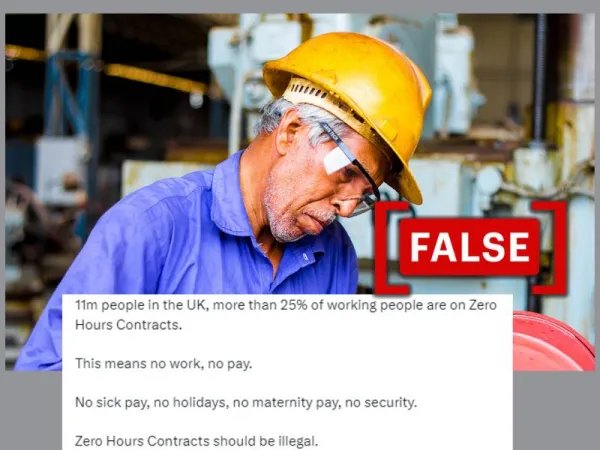By: Ankita Kulkarni
June 13 2024
 A screenshot the text shared by viral post claiming that 11 million people in the U.K. are on the zero-hours contracts. (Source: Facebook/Screenshot/Modified by Logically Facts)
A screenshot the text shared by viral post claiming that 11 million people in the U.K. are on the zero-hours contracts. (Source: Facebook/Screenshot/Modified by Logically Facts)
The Office for National Statistics data shows that over one million people, not 11 million, were on zero-hours contracts in the first quarter of 2024.
What is the claim?
A post circulating on social media incorrectly claims that over 11 million people in the U.K. are on zero-hours contracts.
One such post on Facebook includes a screenshot of a text shared on X (formerly Twitter), which reads, "11m people in the U.K., more than 25% of working people are on Zero Hours Contracts. This means no work, no pay. No sick pay, no holidays, no maternity pay, no security. Zero Hours Contracts should be illegal." An archived version of this and another similar post can be viewed here and here. The claim is also circulating on X with 173,300 views, and the archived link of that can be found here.
Screenshot of viral posts circulating on social media. (Source: X/Facebook/Screenshot/Modified by Logically Facts)
However, according to the Office for National Statistics's (ONS) latest data, the figures stated in the viral post are incorrect.
What did we find?
Zero-hours contracts are on-call work in which an individual is paid only for the hours they work the shift. The employer pays an individual with at least the national minimum wage, regardless of the hours offered.
We found that the number of people on such contracts in the U.K. is currently over one million, not 11 million, as the viral posts claim.
We looked into the quarterly dataset uploaded by ONS, which details the number of people on zero-hours contracts, broken down by age, sex, and region. The data spans from 2000 to the first quarter of 2024, and the figures have never reached an annual mark of 11 million in the past 24 years.
A screenshot of the dataset released by ONS shows the number of people on zero-hour contracts. (Source: ONS/Screenshot)
The latest data for the first quarter of 2024, from January to March, shows that 1,032,606 people aged 16 and above were on zero-hours contracts in the U.K. This represents 3.1 percent of those employed and not 25 percent, as seen in the table below.
Speaking to Logically Facts, an ONS spokesperson said, "The most recent figure, for January-March 2024, is 1.033 million. The highest it has ever been was in April-June 2023, when it was 1.221 million."
The number of people on zero-hour contracts in January-March 2024. (Source: ONS/Screenshot)
Furthermore, the post claims these contracts include "no sick pay, no holidays, no maternity pay, no security." However, according to the U.K. government website, individuals under zero-hours contracts are termed "workers". They are entitled to statutory employment rights, including the national minimum wage, paid annual leave, rest breaks, and protection from discrimination. It also adds that they may be entitled to statutory sick and maternity pay, with certain conditions applied.
The verdict
The above evidence establishes that according to the latest data produced by the ONS, over one million people in the U.K. are on zero-hours contracts, constituting up to 3.1 percent of those in employment. The 11 million figure is highly exaggerated. Therefore, we have marked this claim as false.
(Update: The story has been updated to include a response from the Office for National Statistics.)